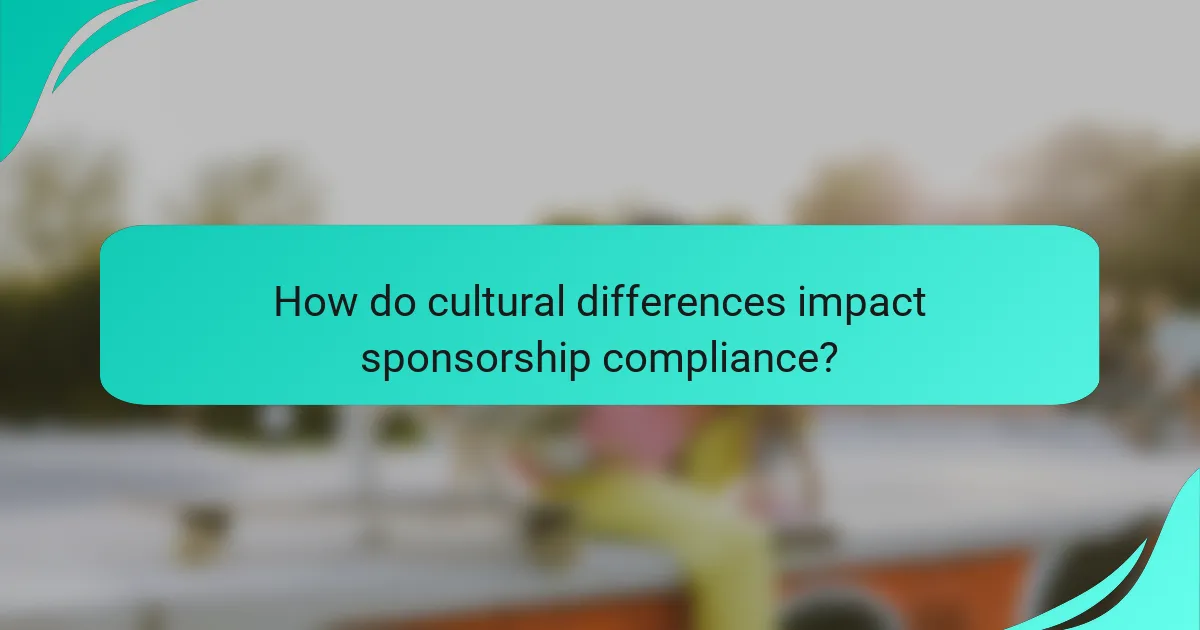Global sponsorship deals present unique compliance challenges that require careful navigation of regulatory requirements, intellectual property rights, tax implications, and data protection laws. To mitigate risks and ensure the legality of these agreements, companies should engage local legal experts and implement comprehensive compliance training programs. Prioritizing clear communication and maintaining transparency can significantly enhance the effectiveness of these partnerships across different jurisdictions.

What are the key compliance issues in global sponsorship deals?
Key compliance issues in global sponsorship deals include navigating regulatory requirements, understanding intellectual property rights, addressing tax implications, and adhering to data protection laws. Each of these areas presents unique challenges that can impact the success and legality of sponsorship agreements across different jurisdictions.
Regulatory requirements in major markets
Regulatory requirements vary significantly across major markets, affecting how sponsorship deals are structured and executed. In the United States, for example, the Federal Trade Commission (FTC) enforces guidelines on advertising disclosures, while the European Union has strict rules on consumer protection and competition law.
Companies should conduct thorough research on local regulations before entering into sponsorship agreements. Engaging legal counsel familiar with the specific market can help ensure compliance and avoid potential penalties.
Intellectual property rights considerations
Intellectual property (IP) rights are crucial in global sponsorship deals, as they protect brand identities and creative assets. Companies must ensure that their sponsorship agreements clearly outline the use of trademarks, logos, and other IP elements to prevent infringement issues.
It is advisable to conduct IP audits and secure necessary licenses before finalizing sponsorship contracts. This proactive approach can help mitigate risks associated with unauthorized use of intellectual property in different regions.
Tax implications for international agreements
Tax implications can significantly affect the financial viability of international sponsorship deals. Different countries have varying tax laws, including withholding taxes on payments made to foreign entities, which can reduce the overall value of the sponsorship.
Companies should consult with tax professionals to understand the tax obligations in each jurisdiction involved in the sponsorship. This includes assessing potential double taxation treaties that may exist between countries to optimize tax liabilities.
Data protection and privacy laws
Data protection and privacy laws are increasingly important in global sponsorship deals, especially with the rise of digital marketing. Regulations such as the General Data Protection Regulation (GDPR) in the EU impose strict requirements on how personal data is collected, processed, and stored.
To comply with these laws, companies should implement robust data management practices and ensure that sponsorship agreements include clauses addressing data handling and privacy rights. Regular audits and training on data protection can further enhance compliance efforts.

How can companies ensure compliance in sponsorship agreements?
Companies can ensure compliance in sponsorship agreements by conducting comprehensive legal reviews, engaging local legal experts, and implementing robust compliance training programs. These steps help navigate the complex regulatory landscape and mitigate risks associated with sponsorship deals.
Conducting thorough legal reviews
Thorough legal reviews are essential for identifying potential compliance issues in sponsorship agreements. Companies should examine contracts for adherence to local laws, industry standards, and ethical guidelines. This process often involves checking for clauses related to anti-bribery, intellectual property rights, and advertising regulations.
It is advisable to create a checklist that includes key compliance areas such as payment terms, deliverables, and termination conditions. Regular audits of existing agreements can also help ensure ongoing compliance and address any emerging legal concerns.
Engaging local legal experts
Engaging local legal experts is crucial for understanding the specific regulatory requirements in different jurisdictions. Local attorneys can provide insights into regional laws and cultural considerations that may impact sponsorship agreements. Their expertise helps companies avoid pitfalls that could arise from unfamiliarity with local practices.
When selecting legal experts, consider their experience with sponsorship deals and their familiarity with relevant regulations. Building a network of trusted local advisors can facilitate smoother negotiations and compliance processes across various markets.
Implementing compliance training programs
Implementing compliance training programs ensures that employees involved in sponsorship agreements understand their legal obligations and the company’s compliance policies. Training should cover relevant laws, ethical practices, and the specific compliance requirements tied to sponsorship activities.
Regular training sessions, workshops, and updates on regulatory changes can reinforce a culture of compliance within the organization. Companies should also encourage employees to report potential compliance issues and provide clear channels for doing so, fostering an environment of transparency and accountability.

What best practices should be followed in global sponsorship deals?
To ensure successful global sponsorship deals, organizations should prioritize clear communication, compliance with local regulations, and relationship management. Implementing structured processes and maintaining transparency can significantly enhance the effectiveness of these partnerships.
Establishing clear contractual terms
Clear contractual terms are essential in global sponsorship deals to define the rights, responsibilities, and expectations of all parties involved. Contracts should outline deliverables, payment schedules, and performance metrics to avoid misunderstandings.
It’s advisable to include clauses that address compliance with local laws and regulations, as these can vary significantly across countries. For instance, sponsorship agreements in the EU may need to adhere to GDPR guidelines regarding data protection.
Regular monitoring and audits
Regular monitoring and audits are critical to ensure that both parties fulfill their contractual obligations and maintain compliance with applicable laws. Establishing a schedule for performance reviews can help identify issues early and facilitate timely resolutions.
Consider conducting audits at least annually, or more frequently if the sponsorship involves significant financial commitments. This practice not only helps in compliance but also builds trust between sponsors and partners.
Building strong relationships with stakeholders
Building strong relationships with stakeholders is vital for the long-term success of global sponsorship deals. Engaging with local partners, sponsors, and community members fosters collaboration and enhances brand reputation.
Regular communication, feedback sessions, and joint planning can strengthen these relationships. Additionally, being responsive to stakeholder needs and concerns can lead to more fruitful partnerships and opportunities for future collaborations.

What are the benefits of effective compliance in sponsorships?
Effective compliance in sponsorships ensures legal adherence and fosters trust between brands and partners. By prioritizing compliance, organizations can minimize risks, enhance their reputation, and unlock new partnership opportunities.
Risk mitigation and legal protection
Compliance helps organizations avoid legal pitfalls associated with sponsorship agreements. By adhering to relevant laws and regulations, companies can protect themselves from potential lawsuits, fines, and reputational damage.
To mitigate risks, companies should conduct thorough due diligence on potential partners and ensure that all sponsorship contracts are reviewed by legal experts. Regular audits and compliance training can further safeguard against violations.
Enhanced brand reputation
Maintaining compliance can significantly boost a brand’s reputation among consumers and stakeholders. Brands that demonstrate ethical practices and transparency in their sponsorships are often viewed more favorably, leading to increased customer loyalty.
For instance, companies that actively disclose their sponsorships and adhere to advertising standards can build trust with their audience. This positive perception can translate into higher sales and stronger brand equity over time.
Increased partnership opportunities
Effective compliance can open doors to new sponsorship opportunities. Brands that are known for their adherence to regulations are more attractive to potential partners, as they present lower risks and align with ethical business practices.
To capitalize on this, organizations should actively showcase their compliance efforts in marketing materials and during negotiations. Engaging in industry forums and networking events can also help identify compliant partners looking for sponsorship collaborations.

How do cultural differences impact sponsorship compliance?
Cultural differences significantly influence sponsorship compliance by shaping expectations, norms, and legal frameworks across regions. Understanding these variations is crucial for brands to navigate potential pitfalls and ensure successful partnerships.
Understanding local customs and practices
Local customs and practices dictate how sponsorships are perceived and executed in different cultures. For instance, in some countries, direct advertising may be frowned upon, while others may embrace aggressive marketing strategies. Brands must adapt their approaches to align with local sentiments and expectations.
Researching cultural norms can help identify acceptable sponsorship practices. For example, in Japan, building relationships through formal introductions and respect for hierarchy is essential, while in the U.S., a more casual and direct approach is often preferred. Understanding these nuances can prevent misunderstandings and foster better collaboration.
To ensure compliance, brands should engage local experts or agencies familiar with regional customs. This can include consulting with legal advisors to navigate regulations and cultural expectations, ensuring that sponsorship agreements are both effective and respectful of local traditions.
